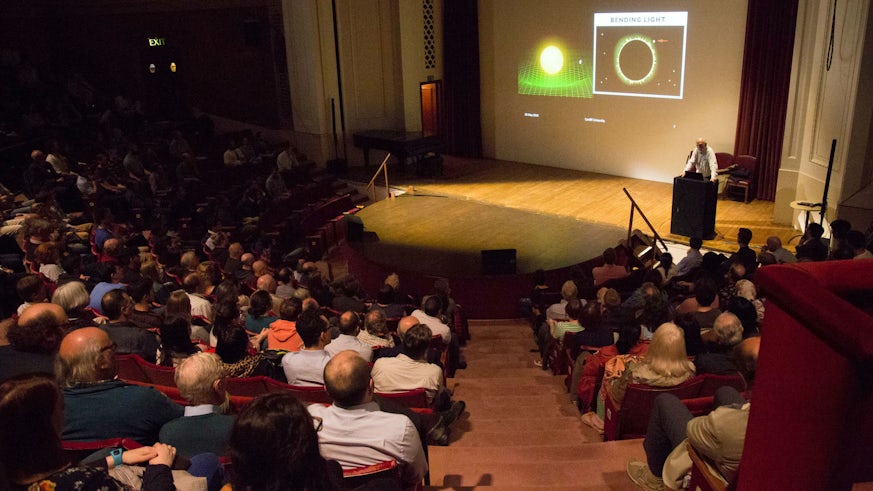Nobel Prize winner welcomed to Cardiff
11 June 2018

Nobel Prize winner Professor Barry Barish has made a special visit to Cardiff University to mark the launch of a brand new research institute specialising in the exploration of gravitational waves.
Professor Barish, who was awarded the 2018 Nobel Prize for Physics, met with staff and postgraduate research students from the School of Physics and Astronomy and delivered a public lecture at the National Museum Wales.
Professor Barish is a Professor of Physics at the California Institute of Technology and was awarded the Nobel Prize – alongside Kip Thorne and Rainer Weiss – for his contributions to the Laser Interferometer Gravitational-Wave Observatory (LIGO) and the first ever detection of gravitational waves.
In the mid-1990s, Professor Barish founded the LIGO Scientific Collaboration, a consortium of over 1000 scientists from more than 80 institutions worldwide. The group operates observatories which detect gravitational waves – tiny ripples in space-time that are emitted from violent cosmic events, such as colliding black holes and neutron stars.
Cardiff University is a founding member of the LIGO collaboration and has made integral contributions to the establishment of LIGO and the detection of gravitational waves.
Using two detectors in the US, LIGO first detected gravitational waves in 2016, emanating from the collision of two black holes that were circling each other over 1.3 billion light years from Earth. Since then, LIGO has detected a further six gravitational wave signals, including the collision of two neutron stars in August 2017. In mid-2017 the Advanced Virgo detector, located in Italy, came online, and more will join the search in coming years.
Speaking ahead of the event at the National Museum Wales, Prof Barish said: “This is one of many trips I’ve made to Cardiff over the last 20 years since I’ve been in LIGO. Cardiff has been involved in [LIGO] very early, especially in terms of the phenomenology – understanding what science we would see if we [detected gravitational waves].
“As the project became more real people here started to involve astrophysicists, and not just gravitational wave people, as well as data analysis.
“We did LIGO to reach a goal that was overwhelming – that is to detect gravitational waves. For many of us we knew there were gravitational waves, it would have been more astounding if there weren’t. The challenge was if we were able to detect them.”
Building on the wealth of expertise at Cardiff University, the new Gravity Exploration Institute will continue the search for gravitational wave signals as part of LIGO and the development of extremely accurate theoretical models of the sources of gravitational waves, with a particular emphasis on binary black holes. The Institute will seek to promote collaborations with astronomers to maximise the astrophysical and cosmological information extracted from the signals. With the support of the University, Institute members are also initiating a new research programme in advanced designs for the next generation of gravitational wave detectors.
“We’re delighted that Barry was able to join us for the kickoff the Gravity Exploration Institute”, said Professor Patrick Sutton, head of the research group in Cardiff. “As well as building on our existing efforts, we’re strengthening our collaborations with other astronomers and extending our research into developing some of the technologies required for the next generation of gravitational wave detectors, so we have an exciting future ahead.”
Share this story
It is a friendly, approachable School with a strong commitment to teaching excellence and world class research in physics and astronomy.
